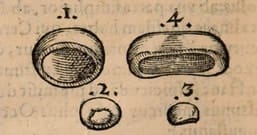Bufonite, Toad Stone
Serpents’ EyesLapis Bufon, Stelon, Lapis Borax, Batrachites (Pliny), Crapodinae, Lycodontes
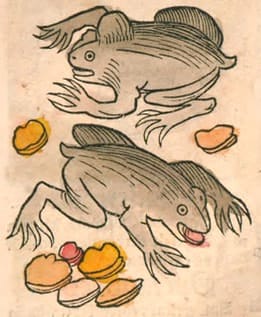
|
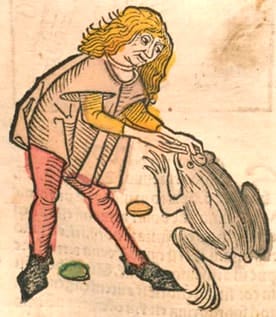
|
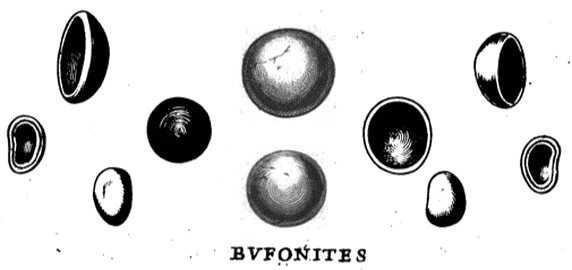 Bufonite
BufoniteMetallotheca Vaticani, Mercati, 1719
|
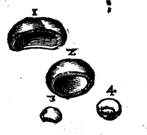
|
|
Museum Wormianum, Olao Worm, 1655 |
De Omni Rerum Fossilium, Gesner, 1565 |
Aldrovandi, Musaeum metallicum, 1648 |
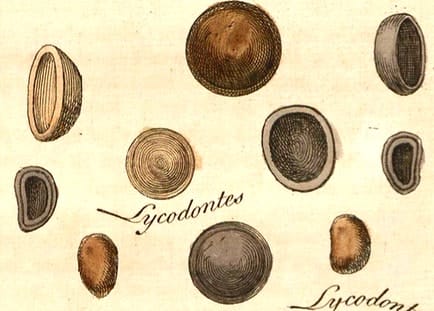 A History of Fossils, Hill, 1751
A History of Fossils, Hill, 1751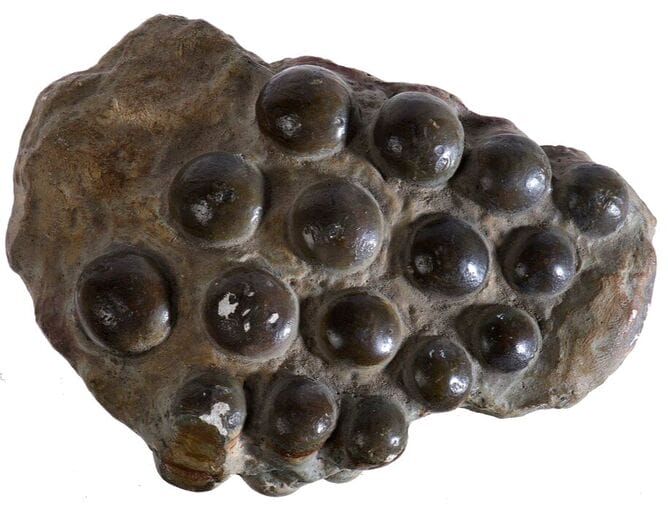 Lepidote Fossilized Teeth (Toad stone)
Lepidote Fossilized Teeth (Toad stone)(Photo by Natural history museum) (Wikimedia)
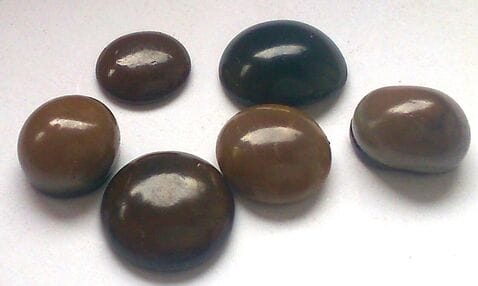 Examples of Toadstone (Lepidotes spp.)
Examples of Toadstone (Lepidotes spp.)(Photo by Baldovio, edited) (Wikimedia)
Zoological name:
Fossilized Palatal Fish Teeth of pycnodont fish;
1. Lepidotes mantelli, L. maximumus
2. Sphaerodus Gigas
Parts used:
Toad Stone was said to come from the head of a Toad. However, it is the round, fossilized grinding teeth of Lepidotes and related extinct fish species.
Several different colors were known, the White being preferred.
Temperature & Taste:
Cold, dry.
Uses:
1. Resists Poison:
-taken internally against various Poisons
-Fevers, Epidemic diseases including Plague (Leonardus, 1502)
-Erysipelas, Toxic Sores and Abscesses, Scrofula, Tumors
-some, such as Albertus recommended swallowing a whole stone which could them be retrieved when passed.
-topically for bites of Wasps, Spiders, Rats and other bites
2. Clears Heat and Damp:
-Edema, Biliousness, Diarrhea
-Spleen diseases
3. Externally:
-applied to bites to draw the poison (like Snake Stone)
-applied to toxic sores to relieve the pain and swelling
-applied to relieve Toothache
-applied to Stop Bleeding (Scottish Folk medicine)
Dose:
Powder: 250mg–1 gram taken in wine.
A whole stone was sometimes ordered to be swallowed and then retrieved from the stool the following day, washed, and reused.
Magical Uses:
-protects Mother and New born infants from evil influences (as an amulet)
-eases Childbirth (Bacon, 1627)
-protects from Witchcraft
-protects from ‘Evil Eye’, due to its similarity to an eye.
-military commanders believed having one in their possession would assure victory on the field.
-when the stone was set in a ring, it was said to ‘sweat’ in the presence of poison. Some claimed it changed color, others that it became warm
Comment:
1. ‘you shall knowe whether the tode stone be the ryghte or perfect stone or not; holde the stone before a tode so that he may see it, and if it be a ryghte and true stone the tode will leape towards it, and make as though he would snatch it; he envieth so much that none should have that stone. (Lupton, 1635)
|
It is said to be a white, brown, or black stone like pebbles found in the head of a dead Toad. This stone has been claimed to be a fossilised tooth of Lepidote, a prehistoric fish with hard, round, pebble-like teeth. It was set in a Gold ring so that the stone touched the skin. It was said to become very hot when near poison, and in this way would give warning that Poison had been served. As with the stone of a Snakes Head, it was simply held over a bite to draw Poison. ‘By putting a Toad into an Earthen pot that hath many holes bored in it, and setting that pot in an Ant-Hill for the Ants to eat him up; for when they have eaten his flesh, the stone with the bones is left behind, as I and many others have often tried’. (Mizald) ‘There is a stone called Chelonites [note ‘Chelonites’ is normally a stone from a Swallows nest] the French name it Crapodina, which they report to be found in the head of a great old Toad. And if it can be gotten from him, while he is alive, it is sovereign against Poison. They say it is taken from living Toad, in a red cloth, in which color they are much delighted. For while they sport and open themselves upon the scarlet, the stone drops out of their head, and falls through a hole made in the middle, into a box set under for the purpose. Else they will suck it up again. But I never met with a faithful person, who said that |
he found it. Nor could I ever find stones which are pretended to be taken out of Toads are minerals. For I remember at Rome I saw a broken piece of stone, which was compacted of many of those stones, some bigger, some less, which suck on the back of it like Limpins on a rock. But the virtue is certain. If any swallow it down with Poison, it will preserve him from the malignity of it. For it runs about with the Poison, and assuages the power of it, that it becomes vain and of no force’. (Natural Magic, John Baptista Porta, 1537-1615) ‘You shall know whether the tode stone be the right or perfect stone or not. Hold the stone before a tode so that he may see it, and if it be a right and true stone, the tode will leap towards it, and make as though to snatch it. He envies so much that none should have the stone’. (Lupton, Book of Notable Things) Culpeper said it was applied to venomous bites as it ‘quickly draws all poison to it.’ ‘Any one may cure the Toothache with the Stone that is in the head of the Toad’. Scottish Highlanders of the 17th century apparently held the Toad Stone in high repute to protect their houses from burning, and to protect their boats from sinking. Military leaders carried the stone to ensure victory in battle. |
From the Chinese Ben Cao Gang Mu:
|
‘Peg the four legs of a big toad with long nails and build a charcoal fire under it to scorch it from morning until noon. Then place a cup of water in front of the Toad. The Toad will spit out a golden, lustrous ball | the size of a honey-locust fruit. A person who swallows one of these balls will be ablw to cross rivers and lakes easily’. |
From Shakespeare
”Sweet the uses of adversity. Which, like the toad, ugly and venomous, Wears yet a precious jewel in his head” (As You Like It)
GENERAL / REVIEW
–Fossils as drugs: pharmaceutical palaeontology


